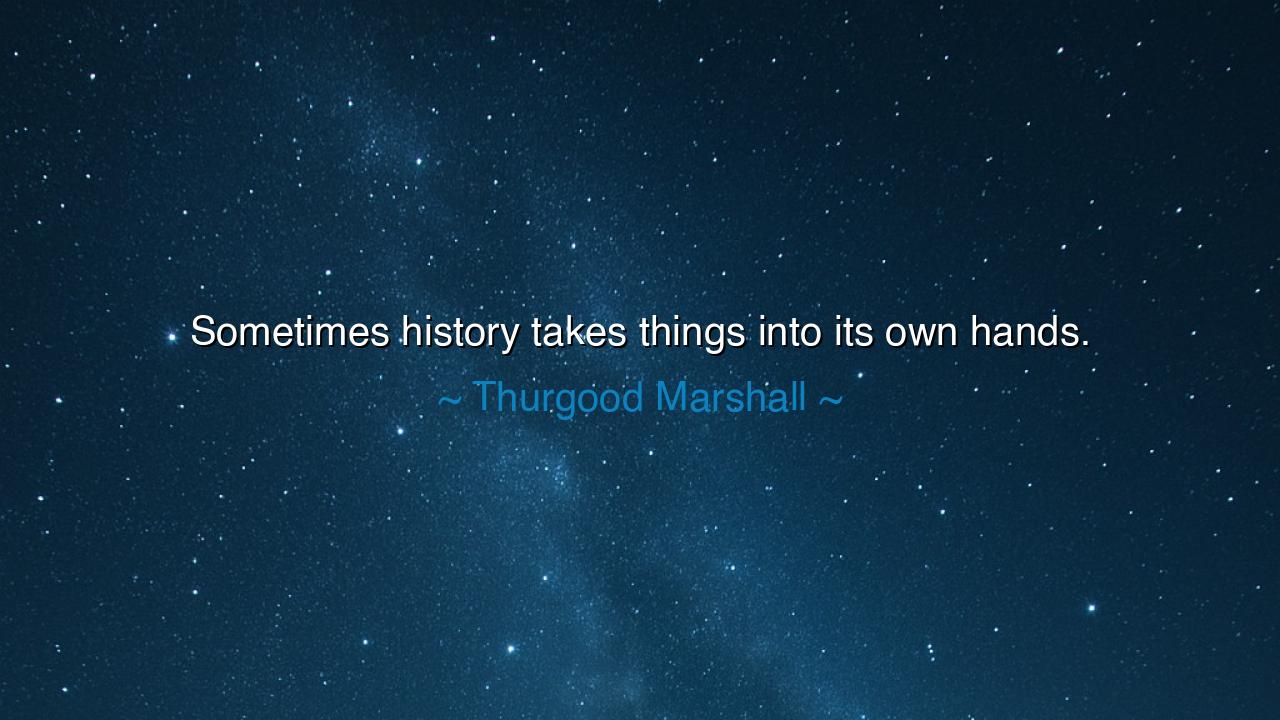
Sometimes history takes things into its own hands.






“Sometimes history takes things into its own hands.” — Thus spoke Thurgood Marshall, the great jurist and champion of justice, whose life’s work helped reshape the moral landscape of a nation. His words are both mysterious and powerful, for they remind us that while men may strive, plan, and struggle, there are moments when history itself becomes an active force — when events seem to move with a will of their own, sweeping aside injustice and inertia alike. Marshall’s phrase is not one of resignation, but of awe — the recognition that truth and justice, once set in motion, can no longer be contained by the designs of those who resist them.
To say that history takes things into its own hands is to admit that there are powers greater than kings, courts, and governments — the power of conscience, of truth, of inevitability. There are times when the will of the people, long suppressed, rises like a tide that no dam can hold. For years, the oppressed cry out unheard, and the world remains unmoved — until, suddenly, the weight of suffering reaches a breaking point, and history awakens. Then, it is no longer the decision of a ruler or a law that drives change, but the momentum of humanity itself.
Such a moment came in 1954, when the United States Supreme Court delivered its ruling in Brown v. Board of Education, a case argued by Marshall himself. For generations, racial segregation had been defended by law and custom, enshrined in the infamous doctrine of “separate but equal.” Yet beneath that lie, the fires of truth burned quietly. The cries of parents, the courage of students, and the toil of countless unnamed souls prepared the way. And when the Court declared that segregation violated the very promise of equality, it was as if history had reached out with its own hands and overturned the tables of injustice. The words of the law had finally caught up with the spirit of humanity.
But this force of history is not always gentle. It can come with turmoil and reckoning, demanding that old structures fall before new life can begin. The fall of the Berlin Wall, the collapse of colonial empires, the rise of movements for liberation — all these reveal the same truth: when the time of transformation arrives, it does not ask for permission. History moves as a living river, breaking through the barriers of pride and fear. Those who try to resist it are swept away; those who move with it become its instruments.
Thurgood Marshall, who witnessed both the cruelty and courage of his era, knew that justice often advances not by steady progress, but by great leaps born of struggle. His words suggest that we, as individuals, are not always the sole architects of destiny. We are participants in something larger — a current of moral evolution that flows through time. When humanity grows weary of oppression, when truth can no longer be denied, when the soul of a people cries out for freedom, history acts. It takes hold of events, of leaders, of nations, and steers them toward a reckoning.
And yet, Marshall’s insight also carries a warning. For when history moves, it demands courage from those who live within it. It calls on the brave to stand firm and on the wise to guide the storm. The march of time cannot be stopped, but it can be directed — toward justice or toward ruin. It is not enough to wait for history’s hand to move; we must also prepare ourselves to rise when it does, to lend our strength and conscience to its work. Those who fail to act when history calls become complicit in its tragedies; those who answer become the builders of its hope.
Let this be your lesson: watch closely the movements of the world, and listen to the stirrings of conscience. When you feel the winds of change rising, do not fear them — join them. When injustice trembles before truth, lend your voice to that truth. For there are times when history seems still, and times when it bursts into motion; in those moments, each soul must decide whether to resist or to help guide the tide.
And remember, as Thurgood Marshall taught through word and deed, that history’s hands are our own. When it acts, it acts through people — through you, through me, through all who dare to do what is right. So live in such a way that when history takes hold once more, it finds your heart ready, your courage steady, and your spirit aligned with the eternal march toward justice.






AAdministratorAdministrator
Welcome, honored guests. Please leave a comment, we will respond soon